Pool maintenance: 6 practical tips
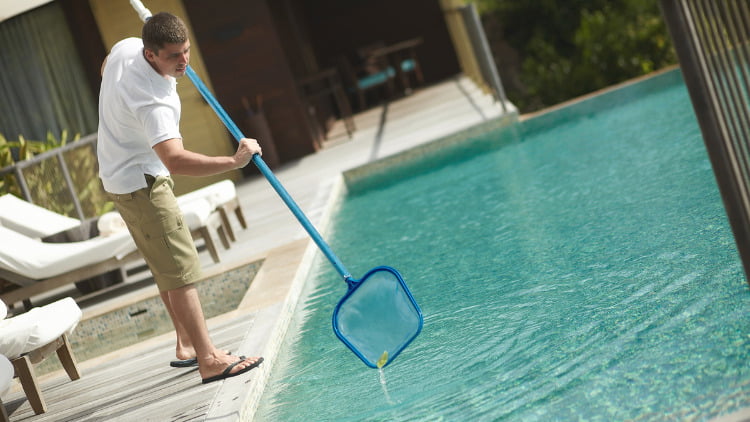
2023/08/03
Owning a swimming pool has many advantages: you can lounge by it and cool off at any time, without leaving the comfort of your property. But it also brings with it a number of responsibilities, particularly when it comes to pool maintenance. Without diligent maintenance, your crystal-clear pool can quickly turn into a Shrek’s swamp, and we’re sure you wouldn’t like that!
In this article, we give you some maintenance tips to help you enjoy your residential pool all summer long!
Maintain water balance:
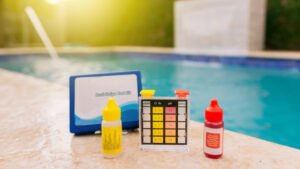
First of all, certain products are essential for the proper maintenance of your pool and for maintaining the quality of your water. These include the use of chlorine or salt to treat your water. Maintaining the chemical balance of your pool water is essential, because water quality is directly linked to your swimming experience. Nobody likes wading in a greenish pool, so it’s essential to keep the water balance under control. To do this, we recommend using test kits to regularly check your water’s pH, chlorine level, alkalinity and hardness. This will enable you to make adjustments using the appropriate products to maintain optimum levels.
Use the right products:
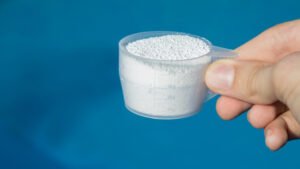
It may sound like trivial advice, but using the right products in the right quantities is essential. It’s important to choose the right products for your needs and to follow their instructions for use. Using the right dose for the size of your pool is essential, as it will have a direct impact on your water. What’s more, each problem is associated with a specific product, hence the importance of choosing the right product. For example, if you have a problem with algae, adding chlorine won’t make any difference. Instead, an algaecide and a shock treatment will solve the problem. In short, whether chlorine or salt, shock treatment or algaecide, these products must all be used properly to produce the best results.
Water filtration:
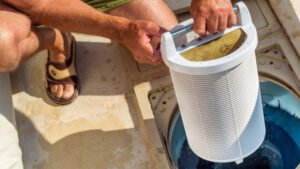
If you’re surrounded by trees, chances are your pool is often covered with leaves, small branches or thorns. Not to mention all the insects floating on the surface of your water! That’s why it’s important to use the net regularly to remove the excess debris that can quickly accumulate. It’s not just a question of aesthetics, either: this debris can create minor problems if it gets in the way of the bottom drain, for example. To ensure optimum filtration of your water, we recommend that you regularly empty and clean the skimmer and pump basket to get rid of any debris that may be lodged there. We also recommend that you occasionally check the filters and clean or, if necessary, replace them.
Cleaning the pool:
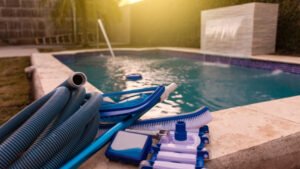
Even if it’s probably not your favorite task, since it requires time and a certain amount of physical effort, it’s essential to clean your pool. This means cleaning the pool walls and floor, for example, by vacuuming. Your pool will then be much cleaner and free of dirt and debris. A good cleaning will also prevent the formation of algae in your pool, a problem you’ll be delighted to avoid! Although this task is often associated with a long brush that must be methodically passed (and re-passed!) over the pool floor, you should know that there are now ways of making your life a whole lot easier, thanks to a robotic cleaner. Today, you can have a robot that cleans everything from top to bottom, isn’t that wonderful? It’s a real time-saver for you, and the results are amazing! Today’s robots are highly advanced, and the technology they’re equipped with means they can clean thoroughly and efficiently. We couldn’t do without them!
Maintaining the circulation system:
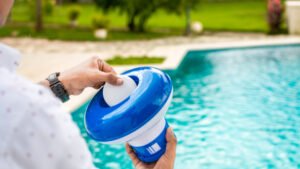
Keeping an eye on the water circulation system is also recommended; this includes pumps, hoses, water return, etc. Good water circulation contributes to water clarity and overall quality. This is because good circulation allows the products used to treat your water to be distributed evenly. So it’s an important step in keeping your water clean and clear.
In short, make sure you clean your pool regularly, keep the water balanced, filter it properly and ensure good circulation. There are many steps, but a pool requires a certain level of maintenance. If you want to maintain beautiful water all summer long, these steps are essential. What’s more, rigorous maintenance reduces the chances of any problems arising.
Preventing problems:
A swimming pool can quickly become a source of problems when it is neglected or not properly treated. When this is the case, many complications can arise.
- Cloudy water
- Presence of algae
- Sticky/slippery bottom
- Irritated skin and eyes
These are the most common problems, and fortunately, they can be solved by adjusting the dosage of specific products or adding specific treatments.
Fixing a problem can be costly, because as the saying goes, prevention is better than cure. This adage even applies to swimming pools, since it’s often more time-consuming, complex and expensive to solve a problem than to have anticipated it. Of course, this may sound easier said than done, but keep in mind that, as a general rule, good daily maintenance (including the use of the right products in the right quantities) is enough to avoid any problems.
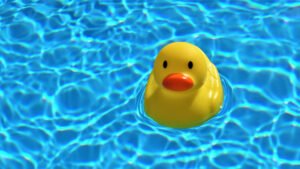
Regular maintenance is essential to keep your pool clean, healthy and pleasant to use. Even if maintenance can sometimes seem tedious, it’s essential, and you’ll be glad you did at the end of the summer! A pool is no picnic, but when it’s properly maintained, all you have to do is lounge around in it or on an inflatable mattress! Enjoy your pool and spend some pleasant moments with your family and friends in crystal-clear water, have a great summer!